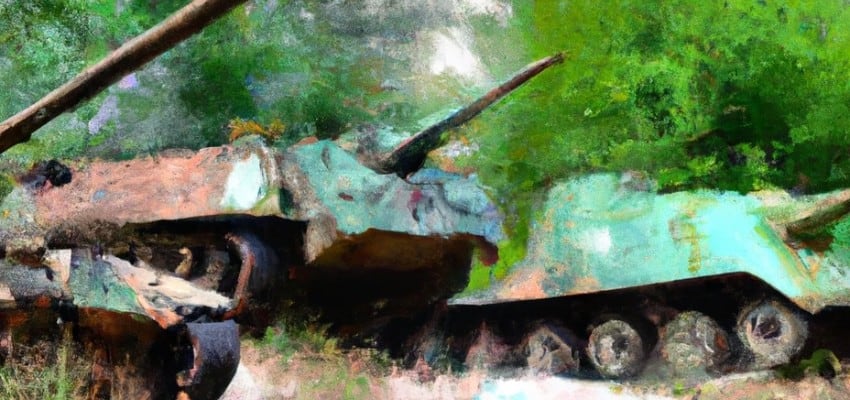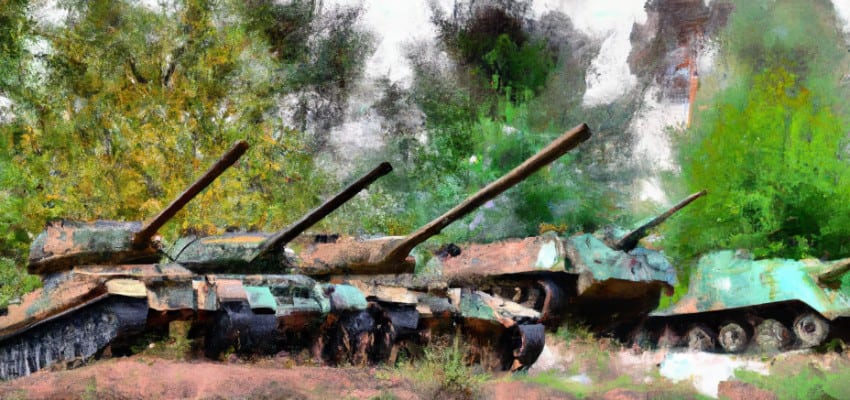|
|
Content Assessment: Failure at Bakhmut? Russo-Ukrainian War Update (April 25 - May 1, 2023)
Information - 94%
Insight - 92%
Relevance - 91%
Objectivity - 93%
Authority - 94%
93%
Excellent
A short percentage-based assessment of the qualitative benefit of the post highlighting the recent Ukraine conflict assessments in maps from the Institute for the Study of War.
Editor’s Note: The discipline of eDiscovery, which involves the identification, preservation, and analysis of electronic data, is increasingly being used in investigations and litigation relating to war crimes. In the case of the Russo-Ukrainian War, eDiscovery tools and techniques can be used to identify and collect electronic evidence of war crimes, such as emails, social media posts, and other digital communications that may provide valuable insights into the actions of individuals and organizations involved in the conflict. This evidence can then be used in investigations and legal proceedings to hold perpetrators of war crimes accountable for their actions. Additionally, eDiscovery can help to efficiently and effectively manage the vast amount of electronic evidence that may be relevant to war crimes cases, allowing investigators and legal teams to quickly and accurately analyze the data to identify key pieces of information. This weekly update may be useful for cybersecurity, information governance, and legal discovery professionals as they consider investigations and litigation resulting from war crimes committed during the war.*
Background Note: One of the most accurate and detailed sources for ongoing updates on the Ukraine crisis is the Russian Offensive Campaign Assessment from the Institute for the Study of War. The Institute for the Study of War (ISW) is a 501(c)(3) organization and produces strictly non-partisan, non-ideological, fact-based research. ISW seeks to promote an informed understanding of war and military affairs through comprehensive, independent, and accessible open-source research and analysis. ISW’s research is made available to the general public, military practitioners, policymakers, and media members. Providing a daily synthesis of key events related to the Russian aggression against Ukraine, ISW updates may benefit investigators and litigators as they follow the business, information technology, and legal trends and trajectories impacted by and stemming from the current Russo-Ukrainian conflict.
Assessment and Maps**
Russo-Ukrainian Conflict Assessments – An Overview in Maps
- Institute for the Study of War (ISW), Russia Team
- Critical Threats Project (CTP), American Enterprise Institute
General Assessment Background Info
- ISW systematically publishes Russian campaign assessments that include maps highlighting the assessed control of terrain in Ukraine and main Russian maneuver axes.
- These maps augment daily synthetic products that cover key events related to renewed Russian aggression against Ukraine.
The Russian Offensive Campaign Assessments
- May 1, 2023
- By Riley Bailey, Kateryna Stepanenko, Karolina Hird, Grace Mappes, Layne Philipson, and Frederick W. Kagan
Key Takeaways
- Russian forces conducted another large-scale missile strike against Ukraine on the night of April 30 to May 1.
- The White House assessed on May 1 that the Russian offensive against Bakhmut has failed.
- Ukrainian officials continue to signal Ukraine’s readiness for potential counteroffensive operations.
- Wagner Group financier Yevgeny Prigozhin is likely using his rehabilitated standing with Russian leadership to amplify his self-promotion efforts and his longstanding issues with the Russian Ministry of Defense (MoD).
- The Russian MoD confirmed the replacement of Russian Deputy Minister of Defense for Logistics Colonel General Mikhail Mizintsev with Colonel General Aleksey Kuzmenkov.
- The Russian MoD opposition faction is likely attempting to remove select MoD officials by publicly criticizing their war efforts.
- Russian forces conducted ground attacks along the Svatove-Kremmina line.
- Russian forces continued ground attacks in and around Bakhmut and on the Avdiivka-Donetsk City line.
- Ukrainian officials indicated that Wagner Group and other Russian forces are struggling to maintain their pace of offensive operations in Bakhmut.
- Russian sources continue to claim that Ukrainian forces are conducting raids across the Dnipro River.
- The recent increased prevalence of Russian private military companies (PMCs) operating in Ukraine may be necessitating certain changes in the overall command structure.
- Russian officials and occupation authorities continue efforts to integrate occupied territories into the Russian socio-economic system.
- April 30, 2023
- By Riley Bailey and Kateryna Stepanenko
Key Takeaways
ISW is publishing a special edition campaign assessment today, April 30. This report details changes in the Russian military command since Russia began its full-scale invasion of Ukraine. Russian President Vladimir Putin’s decision to invade Ukraine without a clear and doctrinal command structure and his reluctance to appoint an overall theater commander have had lasting effects on the structure of the Russian command in Ukraine. Putin’s regular command changes have led to an increasingly factionalized Russian military and disorganized command structures that are degrading the Russian military’s ability to conduct a cohesive campaign in Ukraine. Factions are not a phenomenon particular to the Russian military, although their current dynamics within the Russian military are shaping decision making to an unusual degree. The Russian Ministry of Defense (MoD) and the Kremlin have been deliberately vague about most of these command changes. ISW’s timeline of the changes is based on official Russian statements as well as analysis of unconfirmed claims and reports from Russian, Ukrainian, and Western sources. The exact dates of command changes are based on the first reporting of a change and may not correspond with the formal date on which a change occurred. These command changes were likely not discrete events resulting from decisions made suddenly but were instead drawn-out bureaucratic affairs.
- April 29, 2023
- By Angela Howard, Grace Mappes, Nicole Wolkov, George Barros, Kateryna Stepanenko, and Frederick W. Kagan
Key Takeaways
- Wagner Group financier Yevgeny Prigozhin threatened to withdraw Wagner forces from Bakhmut if the Russian military command fails to provide more ammunition to Wagner mercenaries.
- Prigozhin also continued his efforts to convince the Kremlin to go over to the defensive in eastern Ukraine.
- Prigozhin offered the position of First Deputy Commander of Wagner forces, possibly sarcastically, to former Russian Deputy Defense Minister for Logistics Colonel General Mikhail Mizintsev who was reportedly dismissed from his position on April 27.
- Ukrainian forces attacked an oil storage facility in Sevastopol reportedly with a wave of Mugin-5 UAVs on April 29.
- Russian forces conducted limited ground attacks on the Svatove-Kreminna line.
- Russian forces made limited gains in Bakhmut and continued ground attacks along the Avdiivka-Donetsk City line.
- The Russian Ministry of Defense (MoD) claimed that Russian forces conducted a sea-based missile strike against the command post of the Ukrainian Kherson Group of Forces. Ukrainian officials have so far not confirmed this claim.
- The Russian MoD continues to pursue measures to expedite the conscription process and increase the difficulty of evading summonses.
- Russian occupation authorities and border area officials have expanded security measures and filtration efforts likely in anticipation of increased Ukrainian partisan activity in support of a potential Ukrainian counteroffensive.
- April 28, 2023
- By Karolina Hird, Riley Bailey, Grace Mappes, George Barros, Layne Philipson, and Frederick W. Kagan
Key Takeaways
- Russian forces launched a series of missile strikes against rear areas of Ukraine on the night of April 27.
- The Russian Ministry of Defense (MoD) confirmed the appointment of Vice Admiral Vladimir Vorobyov as the new commander of the Baltic Fleet following the transfer of former Baltic Fleet commander Admiral Viktor Liina to the Pacific Fleet.
- Russian President Vladimir Putin signed a decree codifying conditions for the further large-scale deportation of residents of occupied areas of Ukraine to Russia.
- Russian Defense Minister Army General Sergei Shoigu promoted the Kremlin’s efforts to form a potential anti-Western coalition during a meeting of the defense ministers of Shanghai Cooperation Organization (SCO) member states in New Delhi, India.
- Head of the Kremlin-controlled Russian Orthodox Church Patriarch Kirill of Moscow defrocked a Russian Orthodox Church protodeacon who did not support Russia’s invasion of Ukraine.
- Russian forces continued ground attacks near Kreminna and have made an incremental advance northwest of Kreminna as of April 28.
- Russian forces are increasing pressure against the T0504 Kostyantynivka-Chasiv Yar-Bakhmut highway.
- Russian forces continued routine indirect fire and defensive operations in southern Ukraine.
- Russian President Vladimir Putin tasked Russian officials with developing Russia’s domestic drone industry likely as part of the Kremlin’s effort to gradually mobilize Russia’s defense industrial base (DIB).
- Russian occupation authorities continue to announce patronage programs with Russian federal subjects.
- April 27, 2023
- By Karolina Hird, Grace Mappes, Riley Bailey, Angela Howard, Layne Philipson, and Frederick W. Kagan
Key Takeaways
- The Russian military command appears to be reshuffling the leadership of command organs associated with force generation, sustainment, and logistics.
- The three command organs that are reportedly receiving new leadership as part of this reshuffle are noteworthy because they are associated with managing aspects of Russian force generation, troop sustainment, and logistical oversight.
- Western officials expressed confidence in Ukraine’s ability to conduct a successful counteroffensive.
- Russian forces are reportedly using new tactics to complicate Ukrainian air defenses’ ability to detect Russian missiles.
- Chechen Republic Head Ramzan Kadyrov appears to have launched a renewed campaign for national attention.
- Belarusian Defense Minister Viktor Khrenin met with Chinese Defense Minister Li Shangfu and Iranian Defense Minister Mohammad Reza Ashtiani in New Delhi, India on April 27.
- Russian forces conducted defensive operations in the Kupyansk direction and limited ground attacks near Kreminna.
- Russian forces did not make any confirmed gains in or around Bakhmut but may be transferring additional reserves to the Bakhmut area.
- Russian forces continued offensive operations along the Avdiivka-Donetsk City line.
- Russian forces are further militarizing the Zaporizhzhia Nuclear Power Plant (ZNPP) to defend against possible Ukrainian counteroffensive operations.
- The Washington Post reported that leaked US intelligence documents state that Russian military leaders aim to enlist 815,000 soldiers while balancing concerns about critical labor shortages.
- Ukrainian partisans conducted three separate attacks in occupied territories on April 26-27.
- April 26, 2023
- By Karolina Hird, Riley Bailey, Nicole Wolkov, Layne Philipson, and Frederick W. Kagan
Key Takeaways
- Russia appears to be continuing a deliberate depopulation campaign in occupied areas of Ukraine in order to facilitate the repopulation of Ukrainian territories with Russians.
- Competition among Russian private military companies (PMCs) is likely increasing in Bakhmut.
- The Kremlin continues measures to codify conditions for domestic repression.
- Comments made by Russian officials and prominent voices in the Russian information space continue to highlight a pervasive anxiety over potential Ukrainian counteroffensive actions.
- Chinese President Xi Jinping explicitly recognized Ukraine’s sovereignty and independence, stating that mutual respect for sovereignty and territorial integrity are foundational to Ukrainian-Chinese relations in a conversation with Ukrainian President Volodymyr Zelensky.
- The Kremlin is likely attempting to reassure Armenia that it is a reliable partner despite the fact that the war in Ukraine is limiting Russia’s ability to play a larger role in mediating the Nagorno-Karabakh conflict. The Kremlin may attempt to use conscripts to maintain peacekeeping operations in Nagorno Karabakh and preserve relations with Armenia and other Collective Security Treaty Organization (CSTO) member states.
- Ukrainian sources reported that Russian forces did not conduct any offensive operations along the Kupyansk-Svatove-Kreminna line.
- Russian forces made gains within Bakhmut and north of Avdiivka.
- Russian milbloggers continue to argue amongst themselves about Ukrainian activity along the Dnipro River in Kherson Oblast.
- Russian authorities have started sending military registration summonses that include threats of “restrictive measures.”
- Russian sources claimed that the Russian Federal Security Service (FSB) prevented an attempted attack in Crimea.
- April 25, 2023
- By Kateryna Stepanenko, Grace Mappes, Nicole Wolkov, and Frederick W. Kagan
Key Takeaways
- Senior US and EU officials assess that Russian President Vladimir Putin would remain unwilling to negotiate in response to a successful Ukrainian counteroffensive.
- A Ukrainian military official claimed on April 25 that Ukrainian forces are achieving “impressive results” in counter-battery combat against Russian forces on the Russian-occupied eastern (left) bank of the Dnipro River.
- Wagner Group financier Yevgeny Prigozhin denied ISW’s April 22 assessment about limited improvements in Wagner’s relations with the Russian military command ahead of the planned Ukrainian counteroffensive.
- Russian ultranationalists continue to advocate for the Kremlin to adopt Stalinist repression measures.
- The Kremlin continues to avoid adopting overtly repressive measures likely out of concern for the stability of Putin’s regime.
- Russian civil rights groups OVD-Info, Memorial, and Rus Sidyashchaya (Russia Behind Bars) issued a legal challenge to the Russian censorship law against discrediting the Russian military on April 25.
- Russian sources claimed that Russian forces conducted limited ground attacks on the Svatove-Kremmina line.
- Russian forces continued to conduct ground attacks in and around Bakhmut and along the Avdiivka-Donetsk City frontline.
- Russian milbloggers continued to issue vehement denials that Ukrainian forces established sustained positions on east (left) bank Kherson Oblast.
- The Russian Ministry of Defense (MoD) is attempting to financially incentivize Russian prisoners to fight in Ukraine, offering them compensation equivalent to that of Russian volunteers.
- The Ukrainian Resistance Center reported that Ukrainian partisans detonated a Russian military checkpoint near Oleshky.
We do not report in detail on Russian war crimes because those activities are well-covered in Western media and do not directly affect the military operations we are assessing and forecasting. We will continue to evaluate and report on the effects of these criminal activities on the Ukrainian military and population and specifically on combat in Ukrainian urban areas. We utterly condemn these Russian violations of the laws of armed conflict, Geneva Conventions, and humanity even though we do not describe them in these reports.
Chronology of Maps from April 25 – May 1, 2023 – Mouseover to Scroll
Ukraine Conflict Maps - 042523 - 050123See the Institute for the Study of War Interactive Map of the Russian Invasion
Read the latest Ukraine Conflict updates from the Institute for the Study of War
* Shared with direct express permission from the Institute for the Study of War (ISW).
About the Institute for the Study of War Research Methodology
ISW’s research methodology relies on both primary and secondary sources, enabling researchers to develop a comprehensive understanding of the situation on the ground. In order to analyze military and political developments in any given area, ISW’s research analysts must wholly understand the systems of enemy and friendly forces. They must also understand the population demographics, physical terrain, politics, and history of that area. This lays the analytical foundation for understanding the reasons for particular developments and fulfilling their assigned research objectives. ISW analysts also spend time in places like Iraq, Afghanistan, and elsewhere in order to gain a better understanding of the security and political situation and to evaluate the implementation of current strategies and policies. Our researchers compile data and analyze trends, producing a granular analysis of developments in areas of research, producing an accurate, high-resolution, timely, and thorough picture of the situation. ISW’s research methodology guarantees its success and commitment to improving the nation’s ability to execute military operations, achieve strategic objectives, and respond to emerging problems that may require the use of American military power.
About the Institute for the Study of War
The Institute for the Study of War advances an informed understanding of military affairs through reliable research, trusted analysis, and innovative education. We are committed to improving the nation’s ability to execute military operations and respond to emerging threats in order to achieve U.S. strategic objectives. ISW is a non-partisan, non-profit, public policy research organization.
Learn more, get involved, and contribute today.
Additional Reading
- From Dissent to OSINT? Understanding, Influencing, and Protecting Roles, Reputation, and Revenue
- [Annual Update] International Cyber Law in Practice: Interactive Toolkit
- Data Embassies: Sovereignty, Security, and Continuity for Nation-States
**Assisted by GAI and LLM Technologies
Source: ComplexDiscovery



























